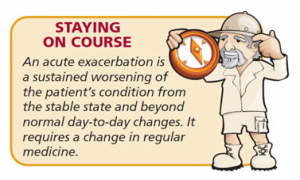Exacerbations: What Do They Mean?
This article was reviewed by Senior Director of Community Engagement and COPD360social Community Manager, Bill Clark, as well as certified staff Respiratory Therapists on January 30, 2020.
Dear COPD Coach,
I’m confused about what having an exacerbation of my COPD really means. Are there any signs or symptoms which my family and I can see that indicate I am having an exacerbation or is this just the same as an infection?
—COPD Exacerbations
Dear Exacerbations,
Knowing the early warning signs of an exacerbation is very important. As we have documented in previous letters, exacerbations are a problem with COPD, especially when you have not quite recovered from a previous exacerbation. And it’s easier to treat an exacerbation in the early stages versus when it is full blown.
First of all, exacerbations are often the result of either a bacterial or viral infection. If you are exposed to harmful pollutants, this can also cause a worsening of your symptoms. The signs to look out for are:

- Your breathing becomes harder than what is considered normal for you. During an exacerbation you may experience unusual breathing sounds like wheezing. This would indicate that your airways may be partially blocked.
- Coughing that is more severe than normal. Your cough may be dry (also referred to as non-productive) or you may be bringing up more mucus than normal. If you are bringing up mucus, it will be yellow, green or bloody if an infection is present. You may also experience increased difficulty when lying down.
- Changes in skin or nail color. A blue tint on your nails or around your lips indicate that you may not be getting enough oxygen. If this happens you should seek help right away! A change in your response to regular breathing medications. For example, if you take a fast-acting reliever medication by inhaler or nebulizer and it always helps you feel “opened up,” but one day it doesn’t seem to help, that is an early warning sign of possible exacerbation.
- Headaches are often a sign of poor oxygen processing. If you wake up in the morning with a headache, and this is a new symptom for you, it could be a sign that you may be experiencing an exacerbation.
- Swelling in your ankles and feeling of pressure on your diaphragm or ribs, are common COPD symptoms and are associated with heart complications or results of lung damage. If these symptoms are new to you or appear to be increasing suddenly, it may be a sign of an exacerbation. Note: Talk with your doctor about chest pain and ask when you should seek immediate medical attention, or when the discomfort is not urgent but may be caused by changes in your ribs or chest wall due to COPD.
- If you feel yourself breathing more from the chest, shoulders, or neck than your abdomen, this can also be a sign of an exacerbation.
- Increased difficulty sleeping or no desire to eat could also signal an exacerbation.
One doesn’t need all of these signs to denote they are having an exacerbation. What is important to note is that if you are able to notice the early signs of an exacerbation, and get treatment, you may well avoid additional complications and possible hospitalizations!
Best Wishes,
The COPD Coach
Coaches Corner is aimed at providing information for individuals with COPD to take to your doctor, and is not in any way intended to be medical advice. If you would like to submit a question to the Coaches Corner email us at coachescorner@copdfoundation.org. We would love to hear your questions and comments. You can address your emails to The COPD Coach.